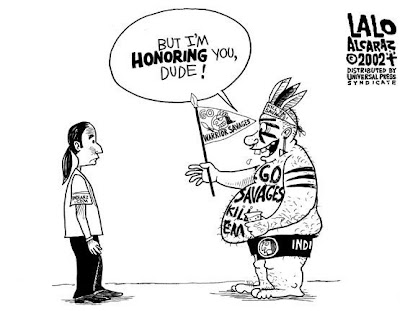URGENT: Please forward this to as many people as possible to make people aware that these actions should not be tolerated. Please view attached photo. This is just one example of what took place during Sungod.
To whom it may concern:
On Friday May 14th, 2010 at UCSD’s annual Sungod Festival, UCSD students dressed in mock Native American attire, including, but not limited to, painted faces, feathers, and headdresses. This act is disrespectful and degrading to the traditions and culture of Natives as the attire is sacred to many Native American tribes. Acts like this perpetuate negative stereotypes of Native American culture, breeding the insensitivity and misunderstanding that is already plaguing our university. Actions should be taken to properly educate the UCSD community (students, faculty, staff, and Alumni) on Native American culture and issues. As students at UCSD we should not have to see our cultures mocked and ridiculed during a student sponsored event taking place at our university.
Native American students were forced to witness these acts of disrespect and see their peers mocking and degrading what is considered to be sacred attire in many of the Native American cultures. Though the university was awakened to issues of diversity and campus climate at UCSD in the past few months, based on these numerous incidents of disrespect it is apparent that the university needs to take more action to promote diversity and cultural awareness among the UCSD community (particularly with regard to the Native American community with whom the university has had a long history of discontent).
The denigrating acts are a product of the ever-diminishing Native American presence on UCSD: UCSD’s Native American undergraduate population is less that 1%, there are few (if any) Native American Faculty, there are very few classes taught on Native American issues and there is still no Native American Studies Minor. These are just a few factors that allow acts of ignorance such as those carried out during Sungod to take place.
While the Native presence at UCSD is small, there is no excuse for the lack of knowledge and representation that the students and local Native American community feel from the university. The university needs to increase their efforts to outreach to the local Native American community. Members of the Native American Student Alliance have worked to bring the American Indian Recruitment (AIR) Program to UCSD. While we would like to see this program flourish at UCSD, it is difficult to do so without the university showing that they would like to see a strong Native presence at UCSD. With the repatriation of local Kumeyaay remains, more classes centered around Native American Studies, increased Native staff and faculty and the institutionalization of the AIR Program at UCSD, the overall tolerance and knowledge of Native American issues will improve along with the current campus climate issue.
Given the recent humiliating incidences of cultural insensitivity at Sungod, the Native American Student Alliance strongly urges the UCSD administration to hold a meeting in order to address the pressing issues of the UCSD Native American community as mentioned above and discuss more specifically the ways in which these goals can be carried out. On Friday May 21st members of the UCSD Native American community will be meeting with UCSD administration to address the recent developments in the Native American Graves Protection and Repatriation Act (NAGPRA) with respect to the “culturally unidentifiable” remains. We strongly suggest that our meeting take place in conjunction with, if not immediately after, the meeting discussing the remains.
Sincerely,
UCSD Native American Student Alliance















